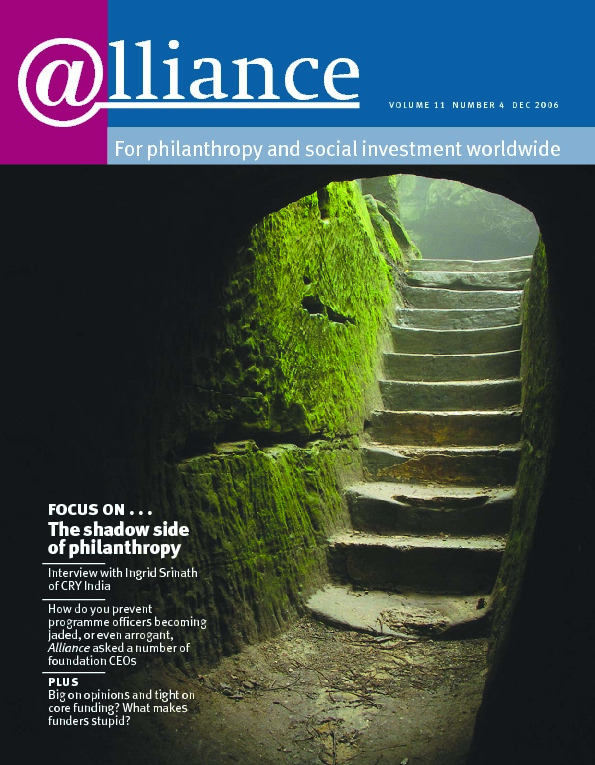Perhaps the most frequently used word in discussions of the non-profit sector today is ‘accountability’. It features in the titles of conferences, articles in the press about non-profit issues, academic journals, and governmental hearings. Why the sudden surge in interest?
Several social forces, some overt and some subtle, seem to have converged to move the issue of non-profit accountability into the spotlight, placing the sector in a defensive position. I believe that there are real dangers here and that getting the response right is crucial to the future well-being of the sector.
This has long been a contentious topic. Accountability was at the heart of the Elizabethan Statute of Charitable Uses of 1601 which established the fundamental legal framework for charitable activity in England and, subsequently, the US. Struggles over accountability have always centred around two compelling, but strongly opposed, principles: 1) the freedom of individuals to control resources dedicated to socially beneficial purposes as they see fit and 2) the responsibility of public authority to ensure that such resources are properly used as it understands the intended public purposes.
In recent years, the forces represented by these two principles have shifted. On the one hand, there has been a dramatic growth in the size and power of the non-profit sector (spurred in part by a huge increase in private philanthropy). On the other, there has been a significant decline in public trust in all social institutions. Expanded resources have led to more instances of misuse of resources, while declining trust has led to greater scrutiny and regulation by government. The result is a potential ‘perfect storm’ of forces leading to increasing governmental regulatory activity that threatens to erode the crucial autonomy and creativity of the non-profit world.
An example of the danger is provided by the recent experience of Wisconsin Public Radio.[1] When the Wisconsin network decided to replace a locally produced programme about car repair with a nationally syndicated programme, some disgruntled listeners claimed the network was being ‘unaccountable’ and complained to the state legislature. Since the legislature provides some funding for the network, it assigned two auditors to inspect their books and threatened other actions, creating such pressure that they felt obliged to change the programming decision. Clearly this is accountability gone politically awry.
So how to avoid this ‘perfect storm’? The solution must lie in more self-regulation by the sector, but this presents its own challenges. I currently serve on the Independent Sector’s Advisory Committee on Self Regulation, and this has brought home to me the difficulty of designing a system that can cover effectively the wide diversity of organizations that make up the sector – including hospitals, universities, chamber orchestras, human rights groups, radio stations, animal protection groups, and homeless shelters.
An example of the difficulty of developing universal standards is the seemingly innocuous question of board size. Assuming that all non-profits should have boards, should there be a minimum size of, say, three or five members? Should they be required to be ‘independent’ – not related to or appointed by staff? This could create problems for small family foundations or other small organizations. The Committee has struggled with hundreds of such questions, trying to develop guidelines that promote good behaviour while not saddling non-profits with needlessly onerous rules.
In the end, I believe the Committee will produce a set of standards that work well for most, if not all, non-profits. Such standards and associated means of oversight, well-conceived and well-administered and energetically conveyed to the public and governmental bodies, can obviate the need for further governmental action.
At the same time, the sector should resist plausible-sounding but misguided efforts to apply external accountability requirements, whether from non-profit or governmental sources, to the substance of its work. Non-profits must remain free to establish their own mission and their own methods of assessing how well that mission is realized. Therein lies the intrinsic quality of non-profit work – the pursuit of private action (privately defined) for the public good. Heavy-handed accountability applied to performance outcomes, whether imposed by a government agency or a non-profit accreditation body, would threaten the very purpose of that pursuit.
1 Although described as ‘public’ in the US, such radio stations are really non-governmental, non-commercial entities that operate as non-profit organizations.
Bruce Sievers is a Visiting Scholar at Stanford University and former Executive Director of the Walter and Elise Haas Fund. Email brsievers@onemain.com





Comments (0)